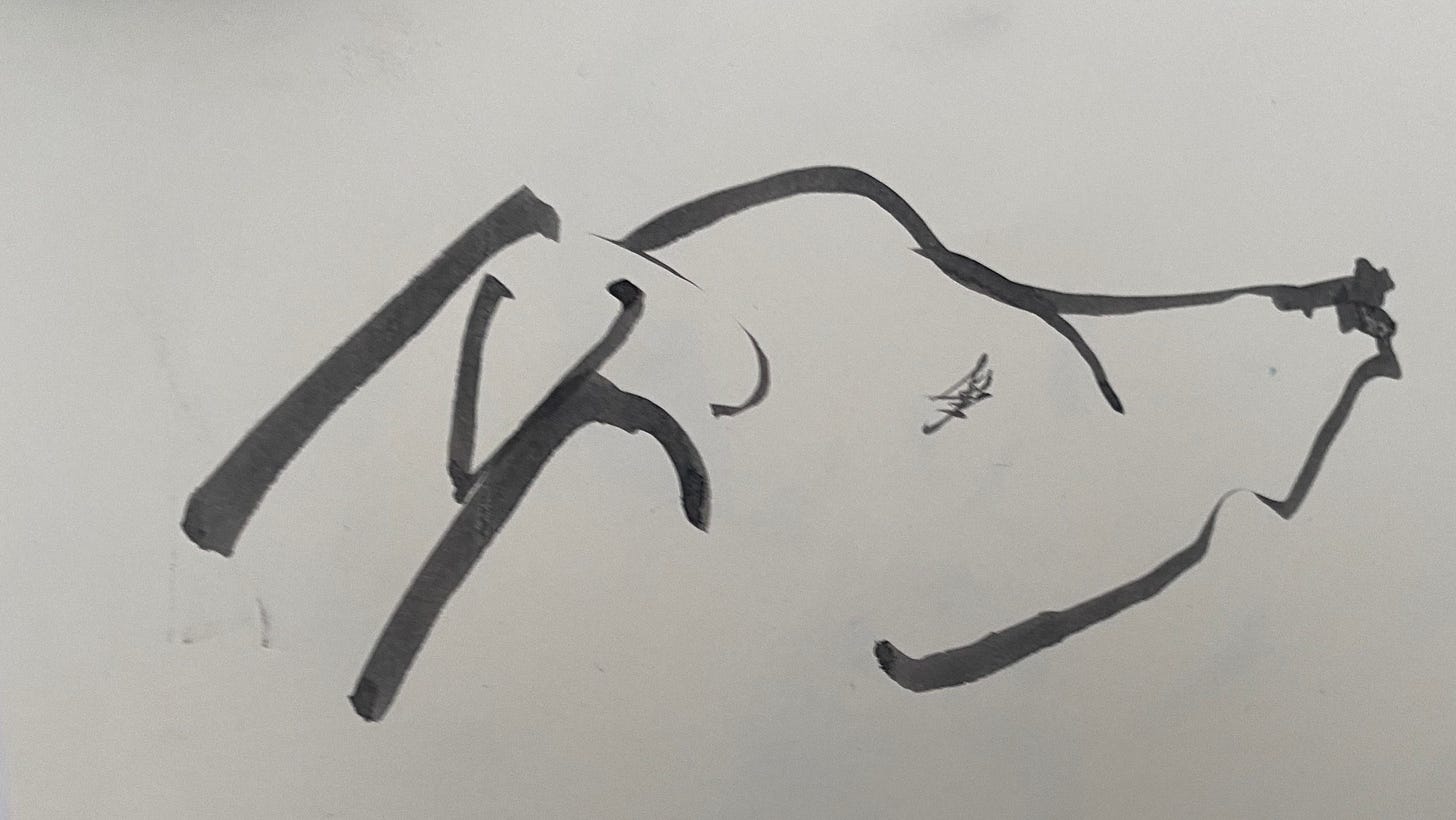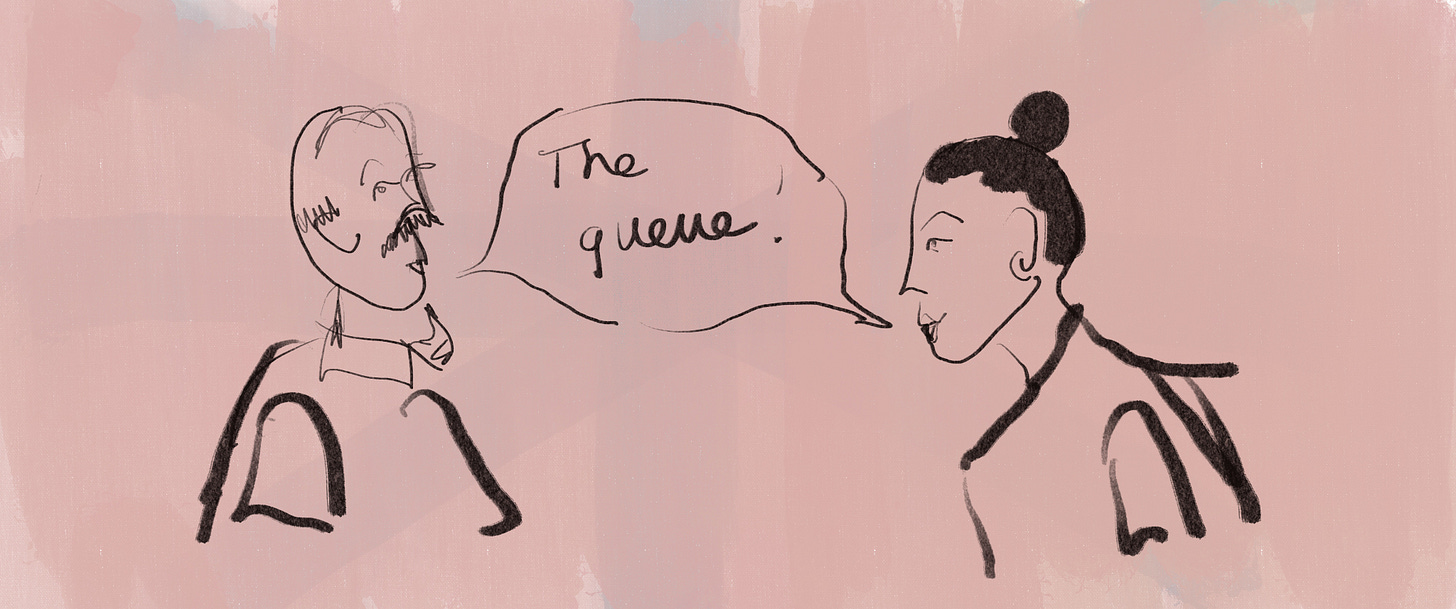The queue was wonderful
Connection and communities and queues
Dear Friend,
I hope you’ve had a good week and relaxing weekend. If you’ve signed up since my last letter, bienvenue! You can read previous editions of Pen Friend here to get a feel for what it’s about.
There is still a distinct tingly, change-of-season feeling in the air with “la rentrée” and it’s quite pleasing to be amongst the dance of daily life in Paris again. The local kids and their parents are flooding the pavements in the morning, the old-timers are back reading their newspapers in the cafés and corner-bars, and commuters are zipping around on bikes and e-scooters. It’s the first ‘normal’ rentrée since 2019, the year I first moved to Montmartre, and it feels like some kind of dust is slowly settling after the pandemic.
Before I came to my current apartment in the 18th arrondissement, I lived in the south of the city, not too far from Montparnasse. My previous building had a live-in concierge, or as they are known here, ‘gardienne’. Not all buildings have one, but many do. They are a sort of all-purpose housekeeper and usually live for free in an apartment on the ground floor of the building. They are often, though not always, female, and traditionally it’s a role that has been associated with Portuguese immigrants to France.
My former gardienne, a tiny elderly Portuguese woman, was a perfect archetype of the role. She was known to the building only as “Madame”. Though much of her work was manual—like cleaning the common areas, maintaining the flower pots in the courtyard, collecting deliveries—she was always immaculately turned-out: think dyed jet-black hair coiffed into a little bob, drawn-on eyebrows and clickety-clackety heeled shoes that raised her stature from maybe 4-foot-8, to 4-foot-10.
Despite her petite size, Madame wielded a stern power over the building. I shared the ground-floor flat on the street level, just across the corridor from hers, with my dear roommate Ellen, who has now returned to Dublin, but will always remain my soul(room)mate. We always said “bonjour Madame!” and stopped for a chat when we saw her, and I think she came to have a sort of motherly feeling towards us both. She always called us “mes petites anglaises”, no matter how many times Ellen specified that she was Irish. From time to time, she would be known to hold on to our forearms in what Ellen termed the “old-lady-grip” to dispense some important piece of life advice, while holding our gaze with an intent, kohl-lined stare.
One day, I picked up a note slipped under our door, announcing the retirement of Madame. She was going back to Portugal and would spend her twilight years there having a well-deserved rest, surrounded by family. A couple of weeks after the note, she was packing up her two-room gardienne’s apartment. I knocked on her door to say goodbye. “Ah ma chérie”, she said, looking up at me with those intent eyes and reaching to place a hand on my cheek, “merci beaucoup ! And remember: never marry a man who does not make you laugh.” With that, she smiled kindly and closed her door. Her work here was done.
I was in that apartment for two years, and I realised that’s about how long it takes for a French community to know, trust and accept you—so when I moved up to my current place in Montmartre, I was aware I was going to have to integrate into my new neighbourhood all over again. I’d only been here nine months when the country went into a strict police-controlled lockdown.
Strangely, I first started to feel like part of the community in my current apartment during this time. First, because my street is full of small, independent food and drink shops, which were considered essential enough to stay open. Soon, a few words exchanged with the local greengrocer and boulanger became highlights of my day.
We also used to clap for the frontline workers from our windows every night at 8pm. During these clapping sessions, I started chatting (shouting) to my neighbour in the house across the street, whom previously I had noticed for her incredibly verdant balcony and sweet elderly cat. As it turned out, she was a doctor specialising in infectious diseases, and was in fact herself one of the frontline workers in question. In the two years since, we’ve become firm friends (even if she would tell you she merely tolerates me). Her demeanour is stern, but she has hosted me for a Christmas meal in her home and leant me countless books.
What really cemented my place in the community, though, was my dog. I adopted Babbet, a rescue puppy during the lockdown, and suddenly I was meeting new people every day on our walks. Before long, I couldn’t leave the house without a chorus of “Salut Babbet !”, “Coucou Babbet ! Comment ça va ?”, “Oo la la, c’est Babbet !|”. And through dogs, I met people. Through his French bulldog, I met the local hairdresser. Through her Italian mastiff, I met the chatty retiree. Through their dachshund, I met two of my dearest friends here.
Little by little, I began to meet a whole cast of Montmartre characters who are now part of the daily fabric of my life. I tell my friends that my life here isn’t just a cliché, but sometimes when I am saying “bonjour” to the baker, or when the waiter at my local bar is asking after Babbet, it feels just a little like one.
There is so much to say about my local area that I am sure I will write about it again in another letter. I’d be curious to know: Do you have a feeling of a village where you live? How long did it take to feel like you were part of the community?
That’s when the queuing starts in earnest
This week I’ve been listening to BBC Radio 5 Live. As I don’t live in the country I come from, I find that call-in radio is a helpful way to try and get a feel for what’s going on, especially when there is a big event in the news. On Wednesday, I first heard mention of The Queue, that is the waiting line to see the Queen’s coffin lying in state in Westminster Hall. At the time of writing, it stretches three miles and the wait is estimated at 11 hours; the Metropolitan Police has advised nobody else to set off to join the queue before the Queen’s funeral tomorrow.
Everything surrounding the Queen’s death is inevitably a bit surreal, and the queue to see the coffin is kind of perverse and quite sweet at the same time. Throughout the week, I’ve written down quotes I have heard from the radio of what people said about being in The Queue. Here are some:
“It’s cloudy, so it’s not raining, so that’s great”
“It was a lovely queue—we didn’t even need our sandwiches!”.
“The queue was wonderful…”
“There was such camaraderie in the queue”
“I got in the queue spontaneously”
“When you get to the zig-zag, that’s when the queuing starts in earnest”
“The wristband is checked a dozen times, so you do not have to worry about people jumping the queue”
“Decent people will never jump the queue”
Written down, the quotes from the queue read almost like a Spike Milligan poem about British life, or a sketch from Monty Python—and yet it seems so fitting and unsurprising that the Brits would show mass grief in an extraordinary act of ordinariness. It is our way: be as weird as you like, but do it sensibly.
The same callers who described the jovial fun of the queue also described a kind of sacred reverence when they got into Westminster Hall. These are some quotes I wrote down:
“It was a sublime and sacred space”
“You feel you’ve stepped into a magical world which is awe-inspiring”
“The guards were enormous and pristine, uniquely pristine—so still”
“They looked like giants to me”
“You open the door and you’ve gone back in time”
The language is romantic and strangely infantilizing, but many of the callers spoke about how the ritual made them think of relatives they had lost, and how it gave them a sense of peace. It feels a bit like the ceremony of the Queen’s death is providing a kind of release-valve for a tired and confused nation craving reflection, connection, and something that is straightforwardly decent. Which is understandable.
Thirty-second book club
This week I have been reading a religious philosophy book by Erich Fromm called The Dogma of Christ, and Other Essays on Religion, Psychology, and Culture. I am enjoying it, but it’s a bit of a complex one to expound and my reading tastes can sometimes be a bit uncool niche. Therefore, seeing as this letter is already quite wordy this week, I’ll not expound for now.
I am, however, on the hunt of some good novels to read, so please leave any recommendations in the comments!
Thank you very much for reading. Please consider sharing Pen Friend with a friend, if you enjoyed it.
I’ll be back in your inbox next Sunday.
Yours,
Hannah





Ahh Hannah! We Brits are curious amalgam of ancient and modern." Woke" and anachronistic in our traditions.
Luckily I am half Italian as you know and can only queue for so long before my ADHD kicks in and I start counting blue jackets, how many pigeons are on the embankment walls, who has ginger hair, how many portaloos can I count etc. But it is my firm belief that most of my Italian countrymen have ADHD listen to the break neck speed of our lilting sing song language!
The country is enjoying a sombre bank holiday today Hannah, i went to my local co op to buy cat food and the cashier was crying openly... big splashy tears! It made her glasses steam up!
Beautiful penpal and sketches, so look foraward to more . Lots of love xx
Utterly delightful